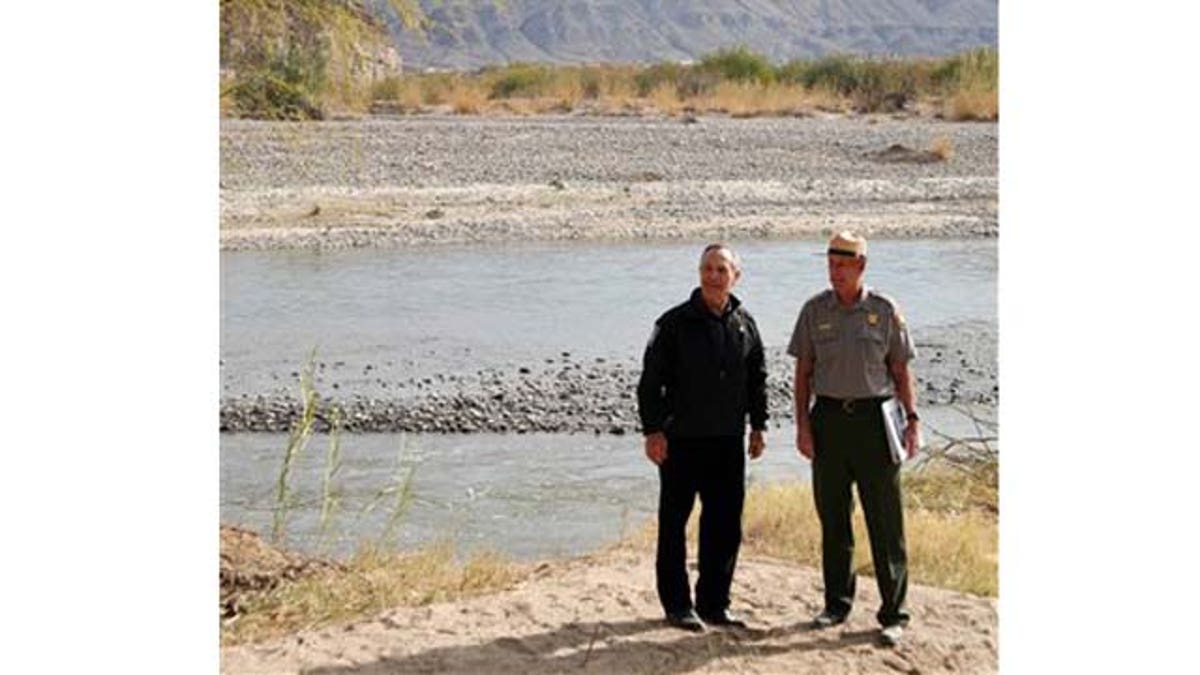
In this photo provided by the Customs Border Patrol, Customs and Border Protection Commissioner Alan Bersin, left is joined by Big Bend National Park Superintendent Bill Wellman at Big Bend National Park, Texas on Thursday, Jan. 6, 2011. Bersin announced that the U.S. has approved a plan to allow informal crossings between American and Mexican territories inside the remote park. (AP Photo/ Customs Border Patrol, Marfa Sector)
Outdoor enthusiasts will once again be able to traverse the Mexico-U.S. border at West Texas' remote Big Bend National Park, authorities have announced.
A border crossing will be built through Boquillas Canyon, which encompasses part of the park and Mexican protected lands, U.S. Customs and Border Protection Commissioner Alan Bersin said at a news conference in the park on Thursday. Construction of the necessary infrastructure, including a boat dock and visitor's center, is set to begin in July and a boat carrying people back and forth should be running by April 2012, he said.
"What's good for one side of the border is good for the other side of the border. This is one, bi-national region," Bersin told a small group of reporters in Big Bend. A Border Patrol spokesman later provided an audio recording of the event to The Associated Press.
There will be no vehicle traffic since everyone crossing will be doing so by boat. The border crossing also will not have customs, but Americans will still be required to show passports or other travel documents to Border Patrol agents, who will be in contact with colleagues in El Paso, Texas, or other, full-service field offices. Mexicans using the crossing will still need U.S. visas.
"While we'll retain our separate national parks and our separate identities as we maintain our separate sovereignties," Bersin said, "nature has a different timeframe in mind and a different set of priorities."
Informal border crossings those not staffed by immigration officials were once common in Big Bend, but they closed down in the months following the Sept. 11 terrorist attacks. Bersin said federal authorities have long supported bringing them back.
"This can be done in a way that would not sacrifice security," he said. "In fact, people who would act criminally can act criminally whether or not there's a lawful crossing here that permits people who want to obey the law and play by the rules."
He said the kind of drug violence that has torn apart Mexican cities like Ciudad Juarez and prompted Washington to warn Americans against venturing to certain areas in Mexico were not a concern in Big Bend.
"This border is, notwithstanding its size and the threat potential, under control, and it is our job to keep it under control," Bersin said. "This border has its risks, but they are manageable and they are being managed."
Bersin said President Barack Obama had spoken to his Mexican counterpart, Felipe Calderon, about making the new border crossing a reality, and that U.S. authorities had been in contact with Mexican military officials who have an outpost on the Mexican side, which is as sparsely populated as the U.S. one.
He said the Big Bend crossing will help both countries preserve biologically sensitive lands and wildlife migration paths, and make travel easier on visitors and area residents. After the informal border crossings were shut down in 2001, people were forced to drive several hours to reach parts of Mexico directly across from the park using ports of entry at Presidio, Texas, about 100 miles to the west, or Del Rio, Texas, nearly 240 miles to the east.
Bersin refused to speculate, however, on the possible establishment of additional informal Big Bend border crossings in the future.
"Let's get this one launched," he said. "We need to handle this case-by-case."
Based on reporting by The Associated Press.
Follow us on twitter.com/foxnewslatino
Like us at facebook.com/foxnewslatino
